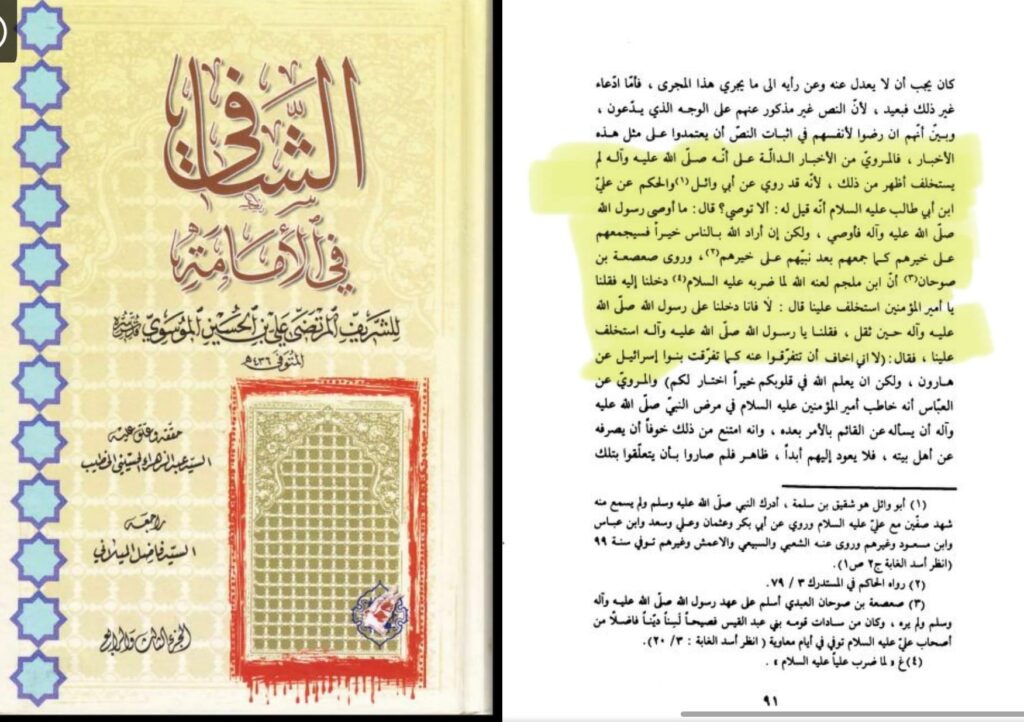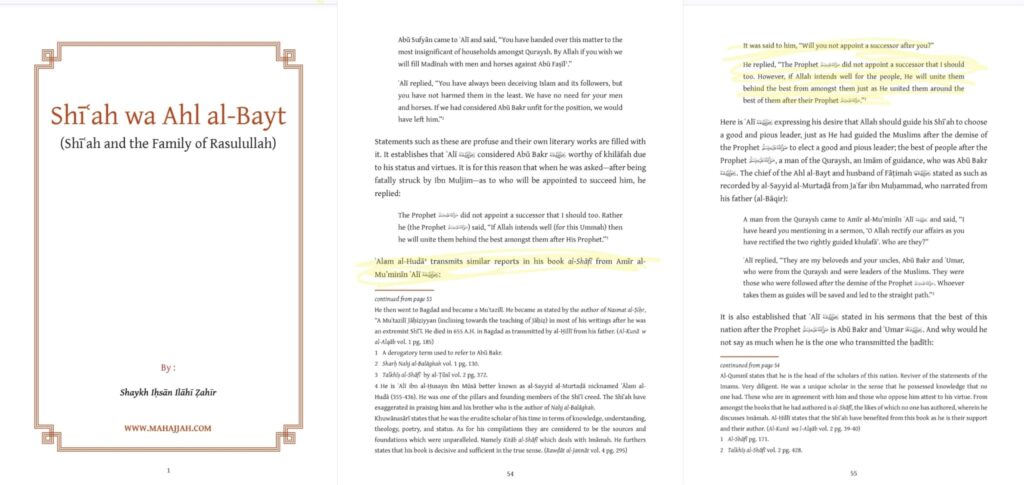One of the most glaring examples of intellectual dishonesty in anti-Shiʿi polemical literature is found in the writings of Iḥsān Ilāhī Ẓahīr. His book al-Shiʿa wa Ahl al-Bayt, often paraded in sectarian circles as an authoritative critique, collapses under even the most basic scrutiny. Ẓahīr does not merely misread or mishandle isolated arguments; his entire project is built on systematic distortion, misquotation, and willful fabrication. He attributes to Shiʿi authorities views they explicitly reject, twisting their words into a grotesque caricature of Shiʿi belief.
The most damning instance of his deception is his treatment of Sayyid al-Murtaḍā’s magnum opus al-Shāfī fī al-Imāmah. In this work, al-Murtaḍā cites the views of his Muʿtazilī opponents particularly Qāḍī ʿAbd al-Jabbār only to dismantle them piece by piece. Yet Ẓahīr, with breathtaking dishonesty, seizes upon these very quotations and fraudulently presents them as if they were al-Murtaḍā’s own convictions.
Consider the following. Al-Murtaḍā, quoting and refuting the Muʿtazilī position, records their claim that the Prophet did not appoint a successor and that doing so would have been a mistake. He then dismantles this reasoning on methodological grounds, explaining that such reports are solitary, unreliable, and wholly inadequate to establish doctrine:
قَالَ صَاحِبُ الْكِتَابِ: دَلِيلٌ لَهُمْ آخَرُ، وَرُبَّمَا تَعَلَّقُوا بِأَخْبَارِهِمْ يَدْعُونَهَا فِي هَذَا الْبَابِ، مِنْهَا مَا طَرِيقُهُ الْآحَادُ، وَمِنْهَا مَا لَا يُمْكِنُ اثْبَاتُهُ عَلَى شَرْطِ الْآحَادِ أَيْضًا، نَحْوَ مَا يَدْعُونَ مِنْ أَنَّهُ تَقَدَّمَ إِلَى الصَّحَابَةِ بِأَنْ يُسَلِّمُوا عَلَى عَلِيٍّ بِإِمَارَةِ الْمُؤْمِنِينَ … ثُمَّ قَالَ: وَقَدْ بَيَّنَ شَيْخُنَا أَبُو عَلِيٍّ أَنَّ هَذِهِ الْأَخْبَارَ لَمْ تَثْبُتْ مِنْ وَجْهٍ يُوجِبُ الْعِلْمَ، فَلَا يَصِحُّ الِاعْتِمَادُ عَلَيْهَا فِي اثْبَاتِ النَّصِّ… وَبَيَّنَ أَنَّهُمْ إِنْ رَضُوا لِأَنْفُسِهِمْ فِي اثْبَاتِ النَّصِّ أَنْ يَعْتَمِدُوا عَلَى مِثْلِ هَذِهِ الْأَخْبَارِ، فَالْمَرْوِيُّ مِنَ الْأَخْبَارِ الدَّالَّةِ عَلَى أَنَّهُ لَمْ يُسْتَخْلَفْ أَظْهَرُ مِنْ ذَلِكَ، لِأَنَّهُ قَدْ رُوِيَ عَنْ أَبِي وَائِلٍ وَالْحَكَمِ، عَنْ عَلِيِّ بْنِ أَبِي طَالِبٍ، أَنَّهُ قِيلَ لَهُ: أَلَا تُؤْمِي؟ قَالَ: مَا أَوْحَى رَسُولُ اللَّهِ فَأُوصِيَ، وَلَكِنْ إِنْ أَرَادَ اللَّهُ بِالنَّاسِ خَيْرًا، فَسَيَجْمَعُهُمْ عَلَى خَيْرِهِمْ، كَمَا جَمَعَهُمْ بَعْدَ نَبِيِّهِمْ عَلَى خَيْرِهِمْ.
The author of the book said: They (the Shīʿa) have another argument, and they sometimes rely upon certain narrations which they themselves claim pertain to this issue. Among these are reports that follow the path of solitary transmissions (ahad), and among them are those which cannot even be established according to the criteria of solitary reports such as their claim that the Prophet instructed the Companions to greet ʿAlī with the title “Commander of the Faithful.”
Then he said: Our teacher Abū ʿAlī has clarified that these narrations have not been established in a manner that leads to certainty (ʿilm), so they cannot be relied upon to establish naṣṣ (explicit designation). He further explained that if the Shīʿa are content to rely on such narrations to establish naṣṣ, then the narrations which suggest that the Prophet did not appoint a successor are even clearer such as the narration reported from Abū Wāʾil and al-Ḥakam from ʿAlī ibn Abī Ṭālib, that he was asked:
“Will you not appoint a successor?”
He replied: “The Messenger of Allah did not receive revelation and then appoint [a successor]. However, if Allah wills good for the people, He will gather them upon the best among them, just as He gathered them after their Prophet upon the best among them.”
(al-Shāfī fī al-Imāmah by Sayyid al-Murtaḍā, vol. 3, p. 91389; al-Mughnī by Qāḍī ʿAbd al-Jabbār, vol. 20, pp. 187–188)

This is the Muʿtazilī claim al-Murtaḍā cites only to refute. And yet, Ẓahīr shamelessly rips this out of context and presents it as if it were al-Murtaḍā’s own words:
‘Alam al-Hudā (i.e. Sayyid al-Murtaḍā) transmits similar reports in his book al-Shāfī, from Amīr al-Muʾminīn ʿAlī:
It was said to him, “Will you not appoint a successor after you?”
He replied, “The Prophet did not appoint a successor that I should too. However, if Allah intends well for the people, He will unite them behind the best from amongst them just as He united them around the best of them after their Prophet.”

